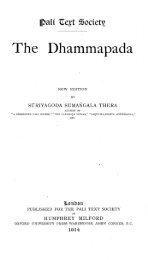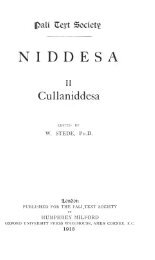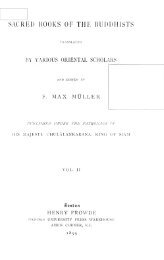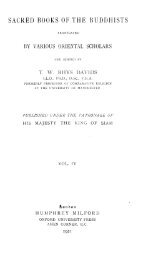Lessons In Practical Buddhism - Sirimangalo.Org
Lessons In Practical Buddhism - Sirimangalo.Org
Lessons In Practical Buddhism - Sirimangalo.Org
You also want an ePaper? Increase the reach of your titles
YUMPU automatically turns print PDFs into web optimized ePapers that Google loves.
Once you see impermanence, it’s not seeing, “Oh, it was like<br />
this before, and now it’s like this.” It’s seeing, “It was before,<br />
and now it’s gone.” Seeing that every experience is and then<br />
is gone, seeing that there actually is no “me” that’s<br />
changing. The person who existed when I was young, the<br />
person who will exist when I am old, all of these things are<br />
just moment-to-moment experience. There actually is no<br />
being. Life is much more fluid than we think, fluid in the<br />
sense of no static entity. For example, when you look at<br />
water, you think it’s a single thing – one body of water, but<br />
actually it’s many, many particles of water flowing together.<br />
anattasaññā<br />
When you see this in regards to your stream of conscious<br />
experience, then you see anatta. You see anatta based on<br />
impermanence and based on suffering, because if it’s<br />
suffering, then you can’t say it belongs to you. If it causes<br />
you suffering, you shouldn’t cling to it; if you cling to it, it<br />
only causes you more suffering. You can’t control it, and you<br />
know that you can’t control it because it causes you<br />
suffering. If you could control it, it wouldn’t cause you<br />
suffering.<br />
This is the theory, but the perception must arise in our<br />
practice. Impermanence, suffering and non-self are right<br />
here and right now. They’re in my voice. Notice when the<br />
voice stops, you’re still thinking about it. It’s still going<br />
through the mind, you can still remember the sound of it,<br />
and normally, because of that, we think of it as continuous.<br />
My voice is still there; it’s just sometimes noisy and<br />
sometimes quiet, but you think I’m talking, so when people<br />
make noise during the talk, you say, “Shh, the monk is<br />
talking now,” even though maybe the monk has stopped<br />
talking. Or someone interrupts you, and you say, “I’m in the<br />
middle of a talk. I’m giving a talk now.” We think like this.<br />
We think, “I’m talking to you now”, when actually there is<br />
only the experience of sound arising at the ear. Once I stop,<br />
the sound has stopped. Seeing this is our practice. When<br />
you see this, this is what leads you to understand non-self.<br />
People have a hard time understanding non-self. What does<br />
it mean? Does it mean that I have no soul? Does it mean that<br />
83












